Human Rights
Ⅰ. Approach, Policy, and Structure
1. Basic Policy
As we realize sustainable growth through Ajinomoto Group Creating Shared Value (ASV), the Ajinomoto Group engages in the SDGs and other efforts related to the international consensus on environmental, social, and governance (ESG) policies. In doing so, we recognize that all business activities must be premised on respect for human rights. We support international standards for human rights including the Universal Declaration of Human Rights, the ILO Declaration on Fundamental Principles and Rights at Work and its Follow-up, and the United Nations Global Compact. Further, we have established our own Ajinomoto Group Shared Policy on Human Rights. This policy is based on the United Nations Guiding Principles on Business and Human Rights (UNGPs) and ensures that as a corporate group that conducts business globally, all of the Ajinomoto Group companies, and officers and employees respect internationally recognized human rights and comply thoroughly with international human rights obligations and related laws and regulations of the countries where we operate. In addition, we encourage our business partners and other related parties (including upstream suppliers) to support this policy and respect human rights, and work together to promote respect for human rights.
The Ajinomoto Group Shared Policy on Human Rights and other policies are approved by the Board of Directors and the Executive Committee before being signed by the president and CEO.
2. Framework
The Ajinomoto Group pursues ESG and sustainability initiatives that include respect for human rights in the supply chain. We pursue these efforts under the Board of Directors, mainly through the Sustainability Committee, a subordinate body of the Executive Committee. The Sustainability Committee and the Sustainability Development Department create roadmaps regarding human rights initiatives in the supply chain, make proposals, and provide support to incorporate sustainability into business plans. These two bodies report to the Executive Committee and the Board of Directors.
In addition, the Business Conduct Committee and its subordinate body, the Human Rights Specialist Committee, lead efforts of the Ajinomoto Group to address human rights issues among employees.
The Board of Directors, Executive Committee, Sustainability Advisory Council, and Sustainability Committee hold respective discussions on human rights topics as appropriate.
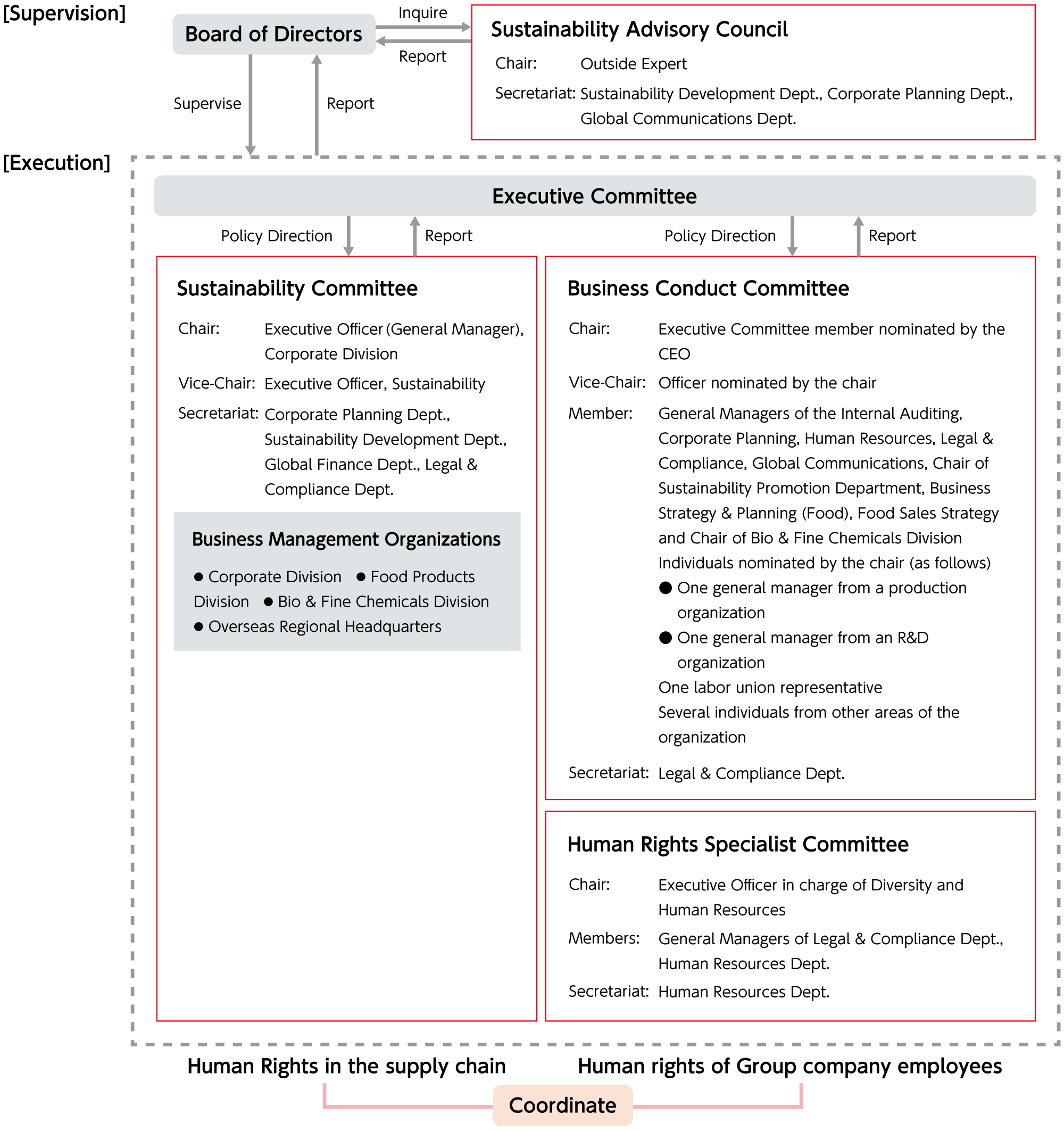
Respect for Human Rights in the Supply Chain.
| Date | Meeting Body | Issues |
|---|---|---|
| February 2, 2023 | Sustainability Committee |
|
| April 27, 2023 | Sustainability Committee | Report results of the Indonesia/Vietnam human rights impact assessment |
| September 25, 2023 | Executive Committee | Report results of the Indonesia/Vietnam human Study session on sustainability information disclosure (CSRD) *Including human rights perspectives |
| October 5, 2023 | Sustainability Committee |
|
| February 15, 2024 | Sustainability Committee |
|
| February 13, 2025 | Sustainability Committee |
|
Respect for Human Rights of Group Company Employees
| Date | Meeting Body | Issues |
|---|---|---|
| April 12, 2023 | Business Conduct Committee |
|
| October 11, 2023 | Business Conduct Committee |
|
| April 10, 2024 | Business Conduct Committee |
|
| October 10, 2024 | Business Conduct Committee |
|
| April 17, 2025 | Business Conduct Committee |
|
Ⅱ. Human Rights Due Diligence
1. Ajinomoto Group Human Rights Due Diligence
In accordance with the UNGPs and the Group Shared Policy on Human Rights, the Ajinomoto Group engages in dialogue and consultation with third-party experts* on human rights and other stakeholders. In this way, we ensure respect for human rights for all stakeholders (employees, business partners, local communities, customers, etc.) across the Ajinomoto Group value chain, including production and sales across all businesses, as part of our human rights due diligence process.
*The Caux Round Table (CRT), the Global Alliance for Sustainable Supply Chain (ASSC)
2. Basic Concepts
At Ajinomoto Group, dialogue with rights-holders is of utmost importance to us when building our management system covering the entire value chain based on the UNGPs. We established the following eight priority human rights issues related to the value chain based on interviews across the Ajinomoto Group. Among them, we prioritized human rights violations upstream in the supply chain and forced labor among migrant workers as a particular high risk.Our human rights due diligence is mainly conducted on these two issue areas. We intend to review priority human rights issues on a regular basis. In the fiscal year 2025, the review will be carried out through workshops in which relevant departments across Group will meet and discuss.
[Excerpt] Ajinomoto Group Priority Human Rights Issues
* Excerpted from the Ajinomoto Group Shared Policy on Human Rights
- Elimination of discrimination
The Ajinomoto Group does not engage in discrimination, harassment or any other affronts to the dignity of individuals on grounds of race, ethnicity, national extraction, religion, creed, sex, age, disability, sexual orientation and gender identity (SOGI) , or other identifying characteristics. - Prohibition of child labor and forced labor
The Ajinomoto Group does not accept any form of child labor, forced labor, bonded labor, or human trafficking. - Respect for fundamental labor rights
The Ajinomoto Group respects fundamental labor rights including freedom of association, workers’ right to organize and collective bargaining rights. - Adequate provision of wages and reasonable working hours
The Ajinomoto Group provides all employees with adequate wages and reasonable working hours. - Ensuring a safe working environment and promoting health and well-being
The Ajinomoto Group provides a safe, hygienic and comfortable working environment and endeavors to promote the health and well-being of all workers worldwide. - Support for work-life balance
The Ajinomoto Group understands the importance of work-life balance and endeavors to make this possible for workers across the globe. - Contribution to building a more diverse and inclusive society
The Ajinomoto Group strives to enhance diversity by respecting the diverse characteristics and perspectives of each individual so that workers all over the world can flourish regardless of factors such as race, nationality or sex. The Group also works to support, empower, and protect the human rights, including in relation to SOGI, of members of vulnerable, marginalized or under-represented groups-such as people with disabilities, migrant workers, or indigenous peoples - through engagement and remediation. - Safeguarding personal information
The Ajinomoto Group adheres to the Act on the Protection of Personal Information and applicable laws and regulations and we are committed to proper safeguarding of all personal information we handle.

| Fiscal year | Ajinomoto Group Initiatives |
|---|---|
| 2023 |
|
| 2024 |
|
| 2025 |
|
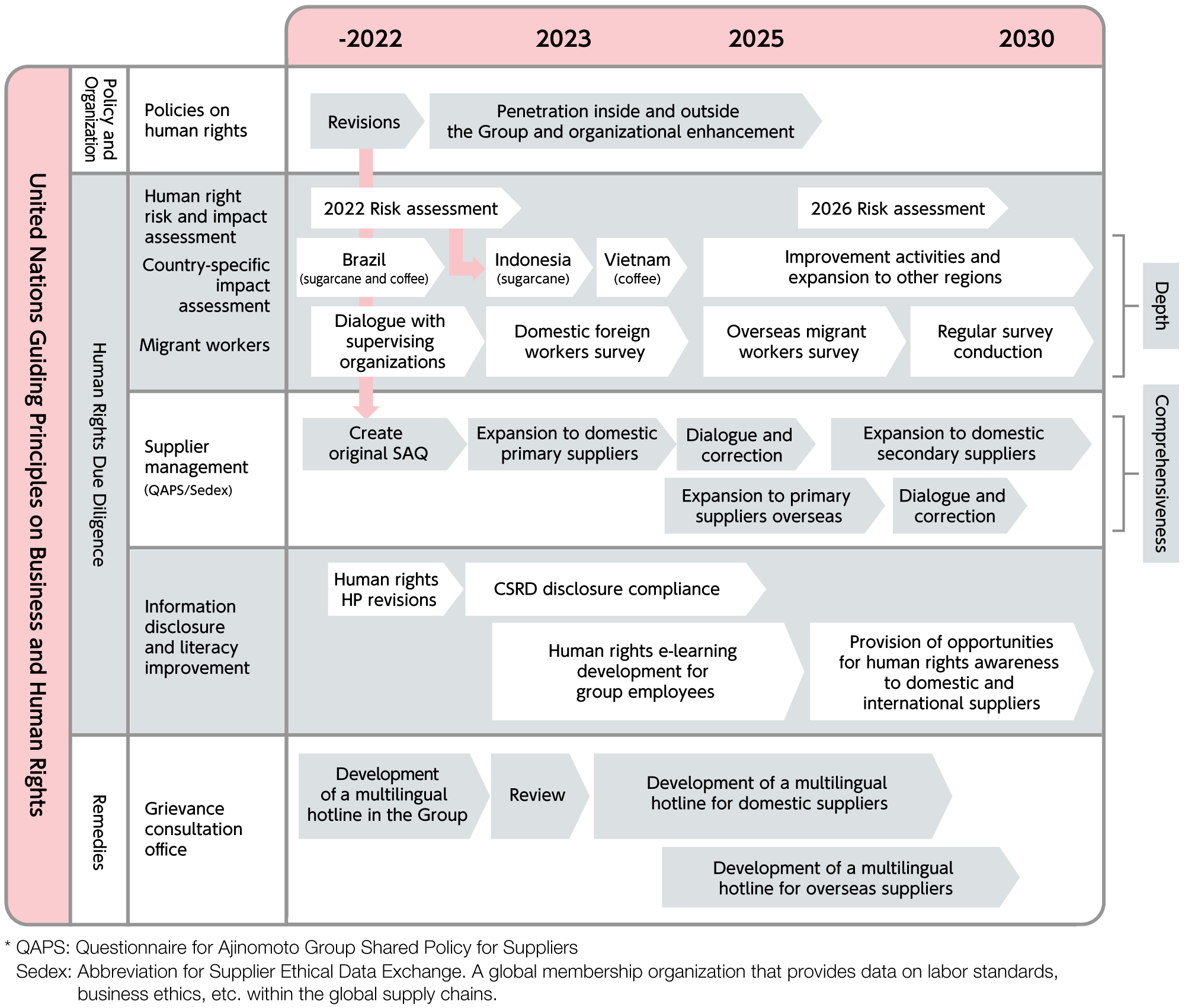
3. Identifying and Assessing Negative Impacts
We pursue initiatives related to human rights upstream in the supply chain, focusing on two aspects: depth and comprehensiveness. In our approach to depth , our main focus is on the direct dialogue with rights holders. Our approach to comprehensiveness supplements the depth approach, aiming for the comprehensive identification and recognition of the risks not thoroughly covered. We are committed to minimizing human rights risks in the value chain through these efforts.
- Depth:
We regularly research and identify potential human rights risks in the countries where we procure priority raw materials and across relevant industries (country-specific human rights risk assessments). For sites of particularly high risk, we conduct on-site visits and direct dialogue with stakeholders (employees of business partners, rights-holders, such as workers of business partners and local communities etc., NPO/NGOs to identify, prevent, and improve human rights issues. - Comprehensiveness:
Strengthening cooperation with suppliers and other business partners is indispensable. We use a unique questionnaire based on the Guidelines for Group Shared Policy for Suppliers to identify human rights risks and support improvements through dialogue.
(1) Human rights risk assessments by country
The Ajinomoto Group conducts country-specific human rights risk assessments every four years(2018, 2022). However, considering changes in the business environment and global human rights issues, an additional assessment was conducted in 2024. The 2024 risk assessment analyzed and identified human rights issues in the countries in which the Ajinomoto Group operates food businesses. We collaborated with external human rights experts (CRT Japan) to analyze analysis risks based on raw material purchases and sales using human rights risk data from the external organizations. We identified high-risk countries, regions, and industries across our own value chain from the standpoint of global human rights.
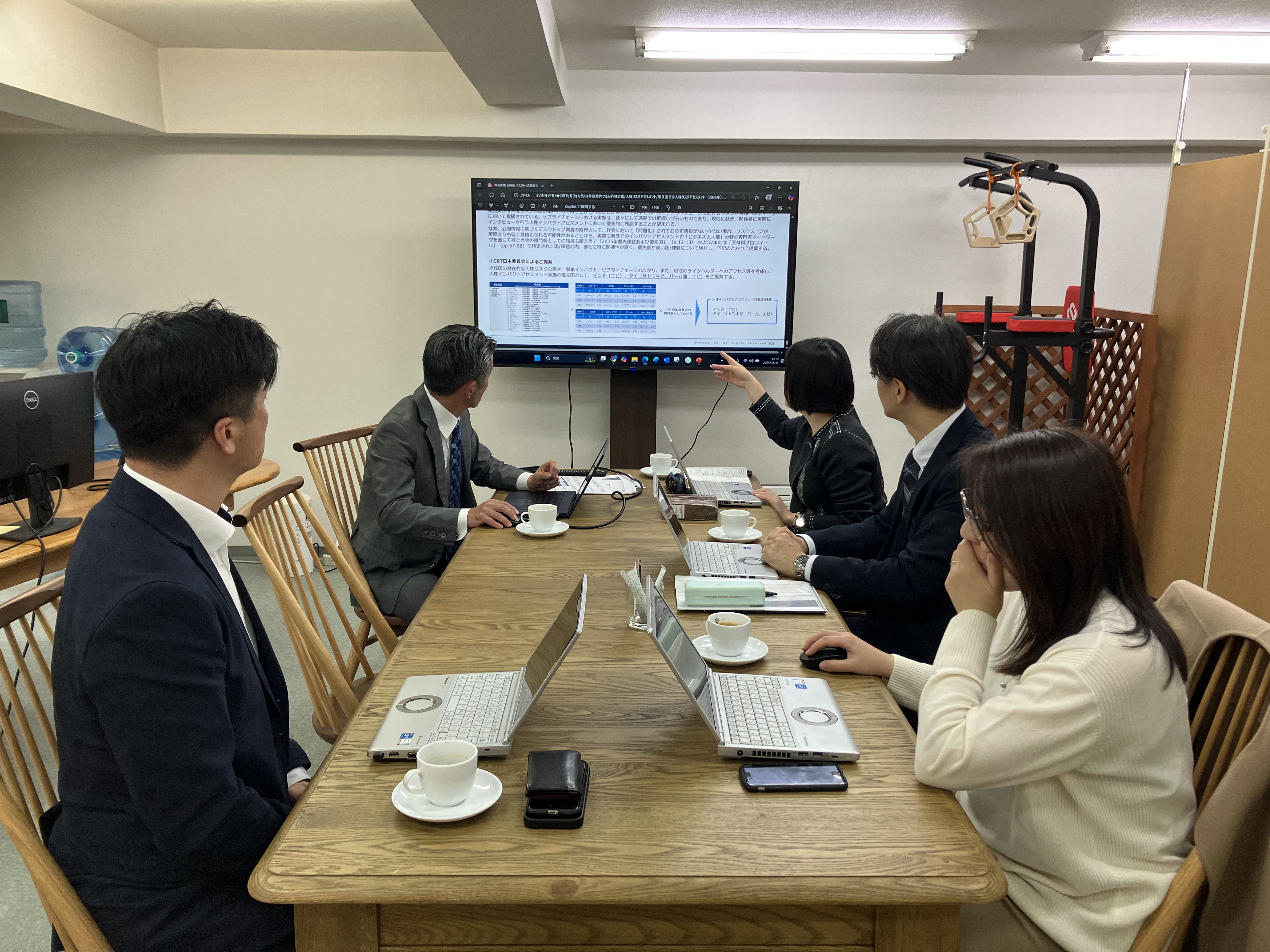
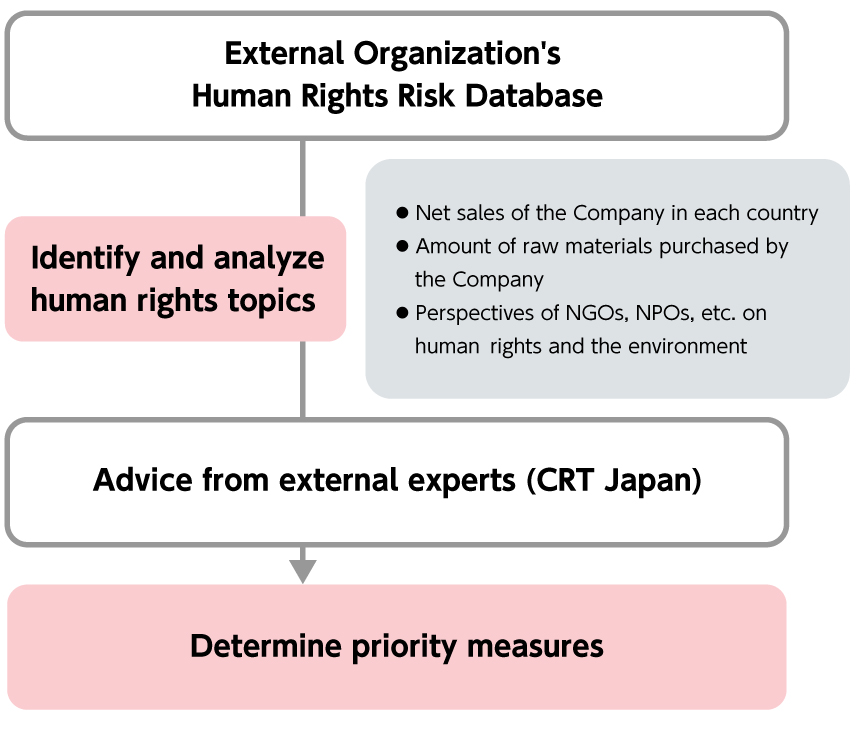
As a result, significant human rights issues were identified for each key raw material, as shown in the table below. Recognizing the limitations of desktop research in understanding the realities of remote areas, the Ajinomoto Group believes it is desirable to conduct on-site visits and engage in direct dialogue with stakeholders in particularly important countries and regions to understand the impacts and issues related to human rights (i.e., human rights impact assessments). Therefore, considering the high potential human rights risks in the respective countries and the breadth of the supply chain, India (shrimp) and Thailand (sugarcane, palm oil, shrimp, cassava) were identified as priority countries for human rights impact assessments. Moving forward, we will prioritize efforts in these countries.
| Target Raw Materials*1 | ①Coffee Bean | ②Soybeans | ③Sugarcane | ④Palm Oil | ⑤Shrimp | ⑥Cassava | ⑦Beet | ⑧Corn |
|---|---|---|---|---|---|---|---|---|
| Priority Issues*2 | Child Labor, Modern Slavery, Land Rights, Occupational Health and Safety, Fair Wages | |||||||
| Target Countries |
|
|
|
|
|
|
|
|
*1 Target raw materials: In addition to the five raw materials targeted in the previous (2022) evaluation, three additional raw materials (cassava, beet, corn) were included.
*2 Human rights issues evaluated: Considering the business activities and supply chain of the Ajinomoto Group, and in consultation with external stakeholders, the following 10 items were identified as potentially having significant negative impacts, and were thus included in the evaluation: child labor, fair wages, reasonable working hours, discrimination, freedom of association, modern slavery, occupational health and safety, land rights, indigenous peoples' rights, and privacy rights.
(2) Human Rights Impact Assessments (Direct Dialogue with Rights-Holders)
Based on country-specific human rights risk assessment results, we conduct on-site visits in high-risk countries and regions, engaging in direct dialogues with stakeholders affected by our businesses rights-holders such as workers of business partners and local communities etc., NPO/NGOs to grasp human rights impacts and issues.
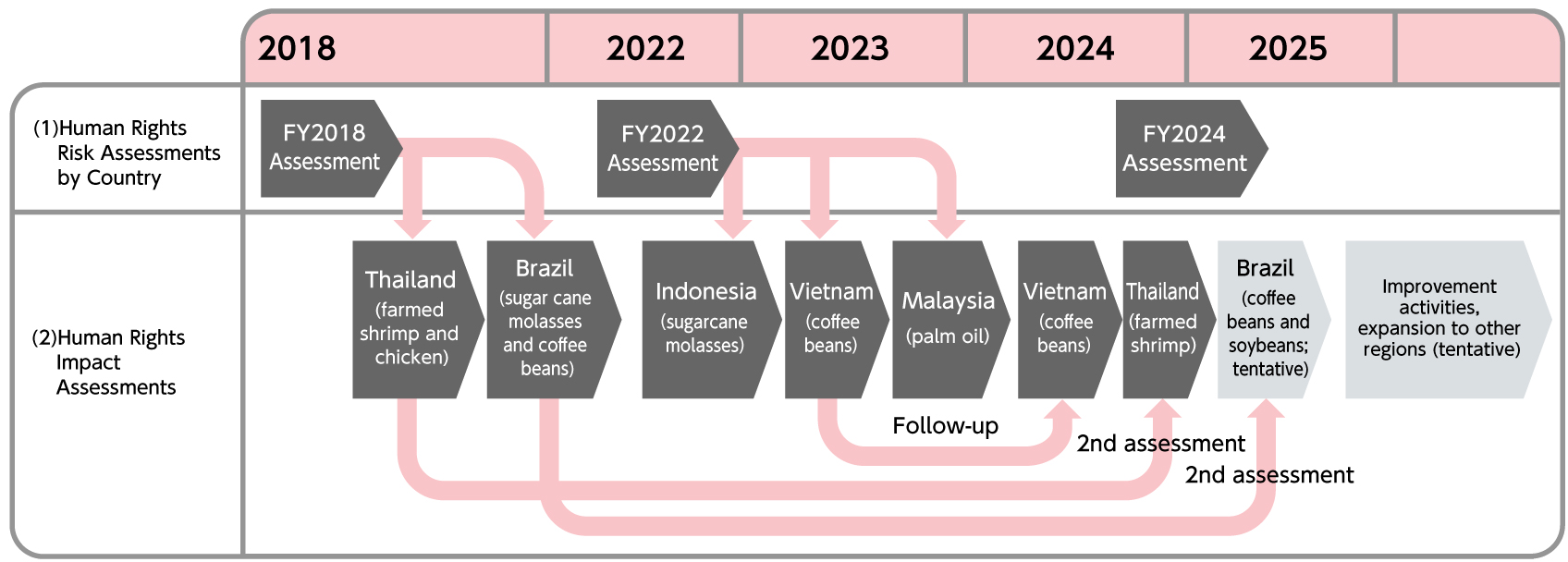
- Human Rights Impact Assessment in Indonesia (Supply Chain of Sugarcane Molasses) (February 2023)
External human rights experts and Ajinomoto Group sustainability and procurement staff visited local work sites and engaged in direct dialogue with manufacturing plant operators, traders, sugar mills, and farmers involved in the Ajinomoto Group sugarcane molasses supply chain.
- Prior explanation to management of Ajinomoto Co., Inc. and the local subsidiary in Indonesia (November and December 2022)
- Human rights impact assessment of the supply chain of sugarcane molasses, Indonesia (February 27th and 28th, 2023)
- Visit to the Surabaya region, Indonesia by third-party CRT Japan and Ajinomoto Group sustainability and procurement representatives as part of efforts to enhance traceability in the region
- Visits to the Ajinomoto Group manufacturing factory, trader, sugar mill, and farmers along the Ajinomoto Group’s sugarcane molasses supply chain to conduct direct dialogues
-
Report of result from CRT Japan (March 10th, 2023)
- Draft report on human rights impact assessment of the supply chain of sugarcane molasses in Indonesia prepared by CRT Japan
-
Information sharing within the Ajinomoto Group (April 2023)
- Feedback of the assessment results to the local subsidiary in Indonesia
- Initiated consideration of specific future action plans
Although we did not find any serious human rights issues, we will continue to monitor the situation related to proper work hour management, remedy mechanisms, forced labor, occupational health and safety, and other issues.
- Human Rights Impact Assessment in Vietnam (Supply Chain of coffee bean) (April 2023)
We went into the local coffee bean industry supply chain and conducted dialogues and interviews with farmers, exporter and local coffee company.
〈Summary of results〉
No serious human rights issues, such as forced labor or child labor, were found within the scope of this time.
On the other hand, some points to be improved were found, including the method of contracting short-term workers during the coffee bean harvest season and the occupational health and safety management method of exporter. (Response under consideration)
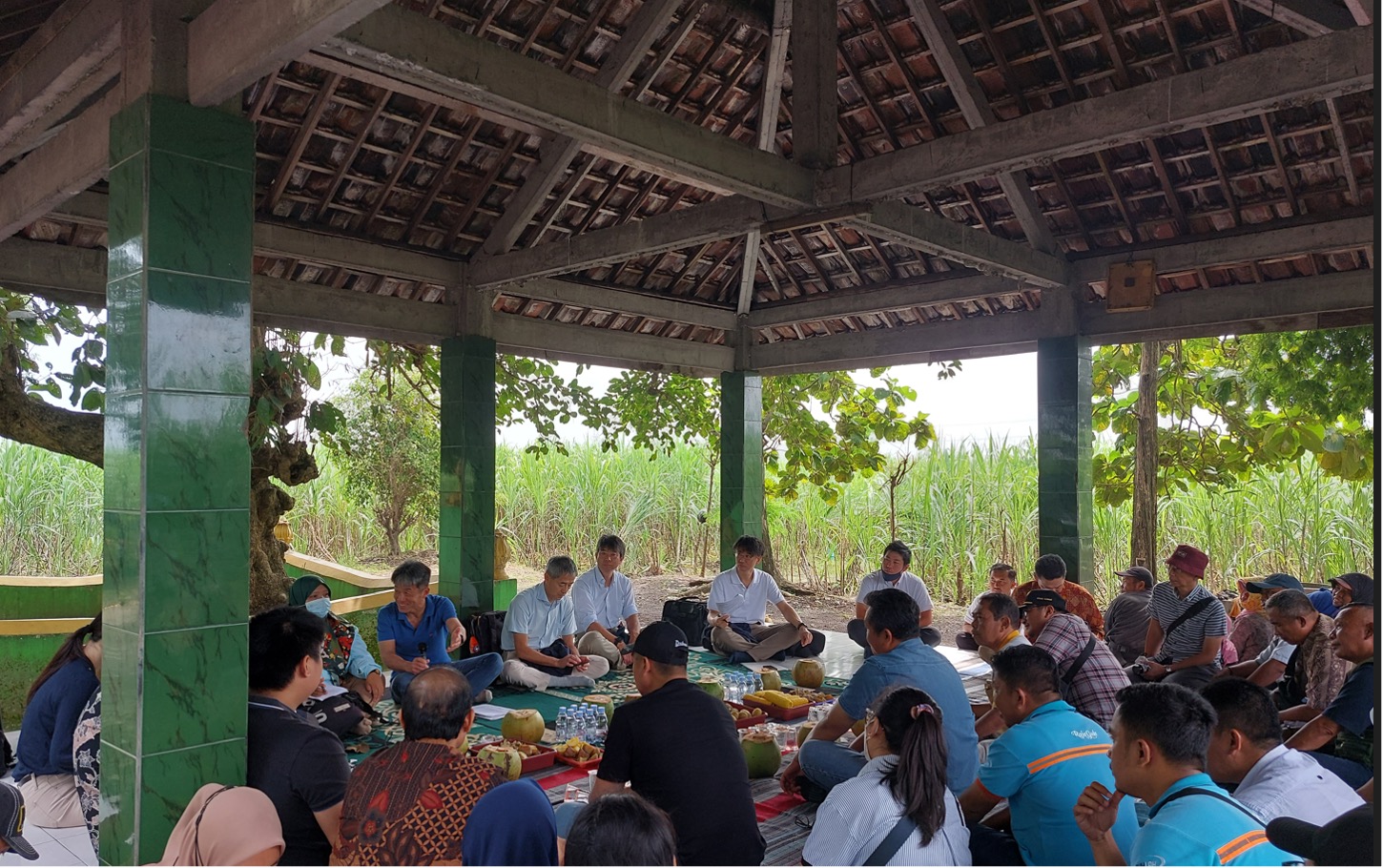
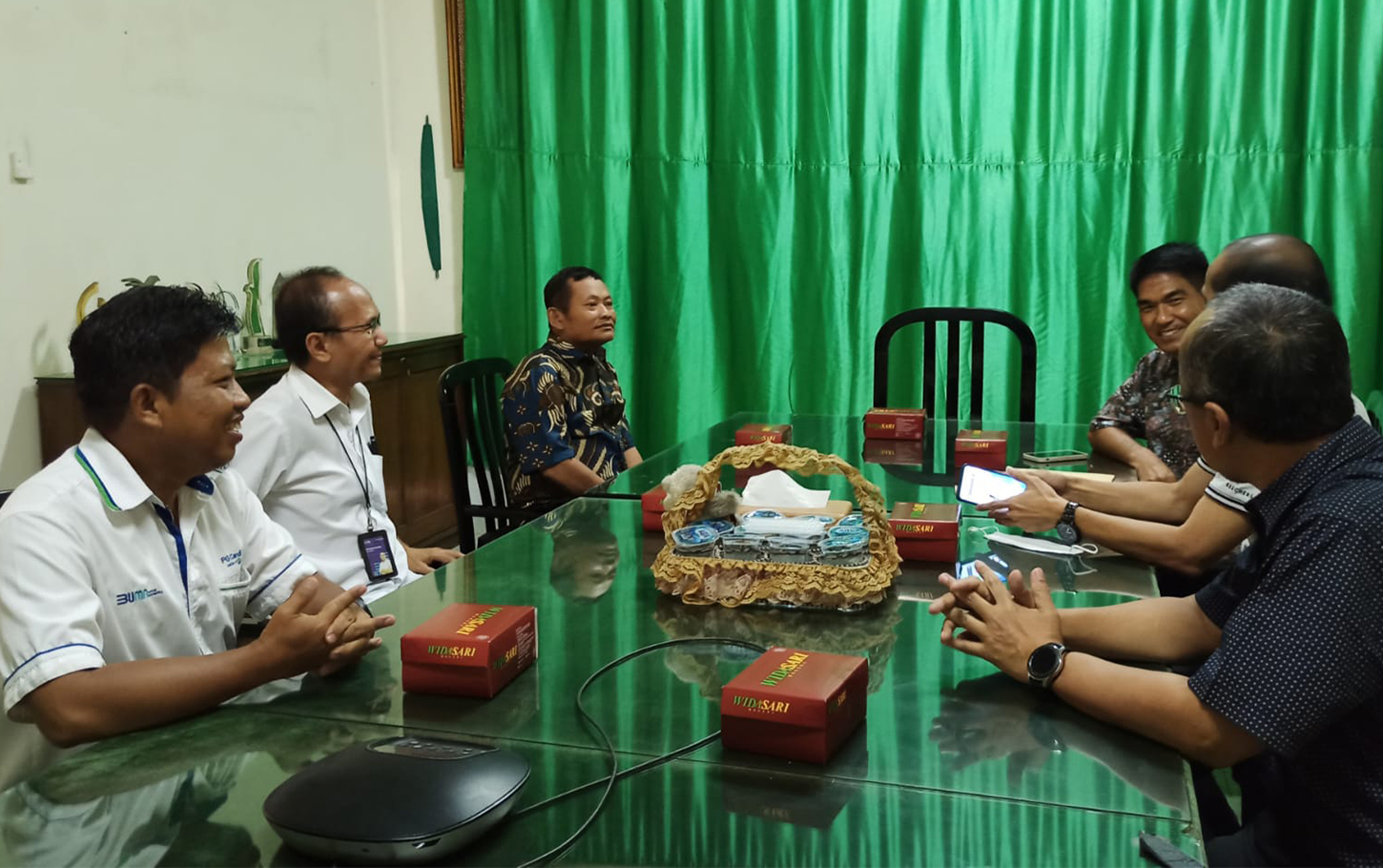
〈Follow-up〉
Based on the above evaluation, we traveled to the site in June 2023 to engage in dialogue with stakeholders in the supply chain regarding human rights issues. We will continue to engage in ongoing dialogue and work on mitigating human rights risks through building trustworthy and good partnerships.
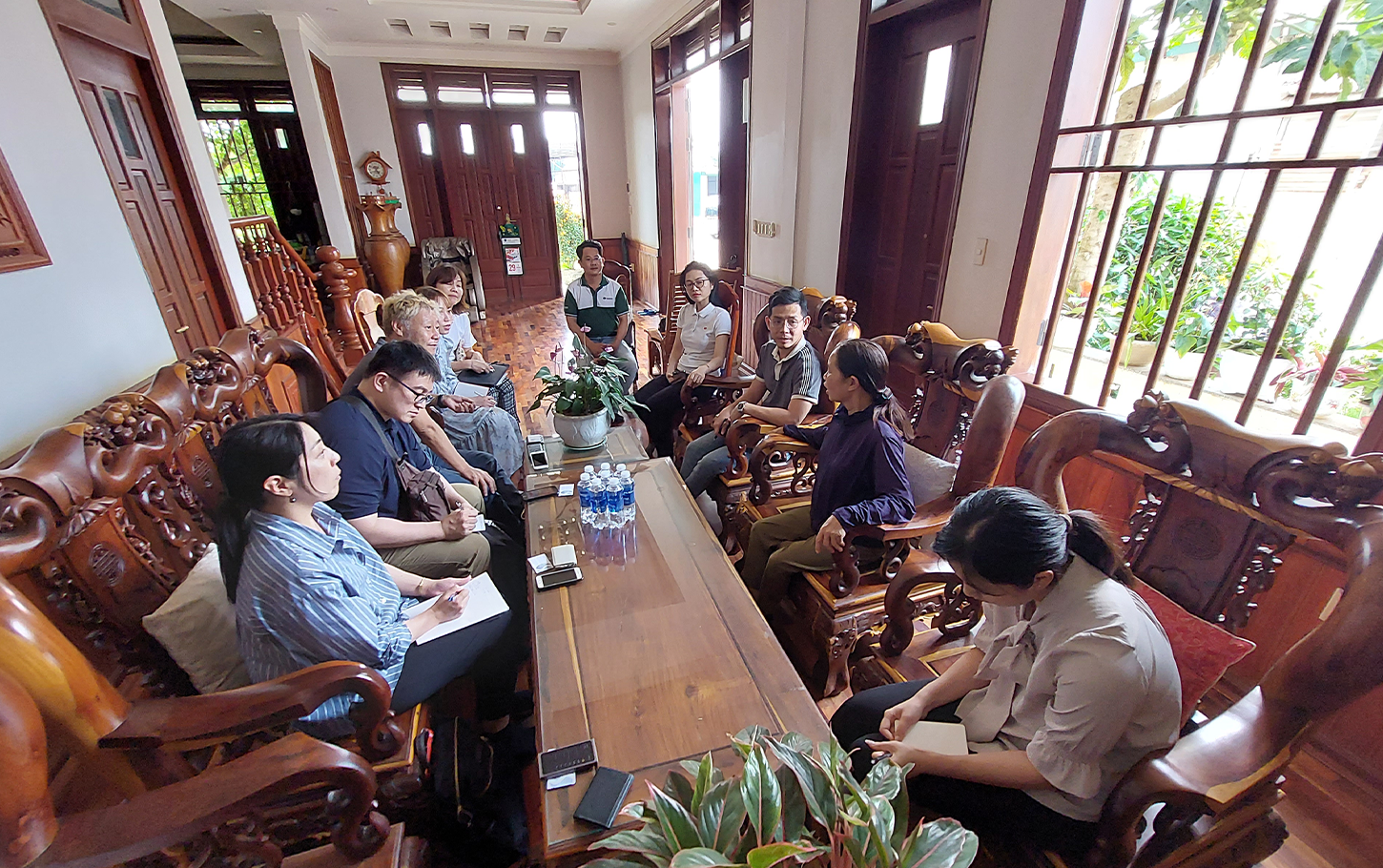
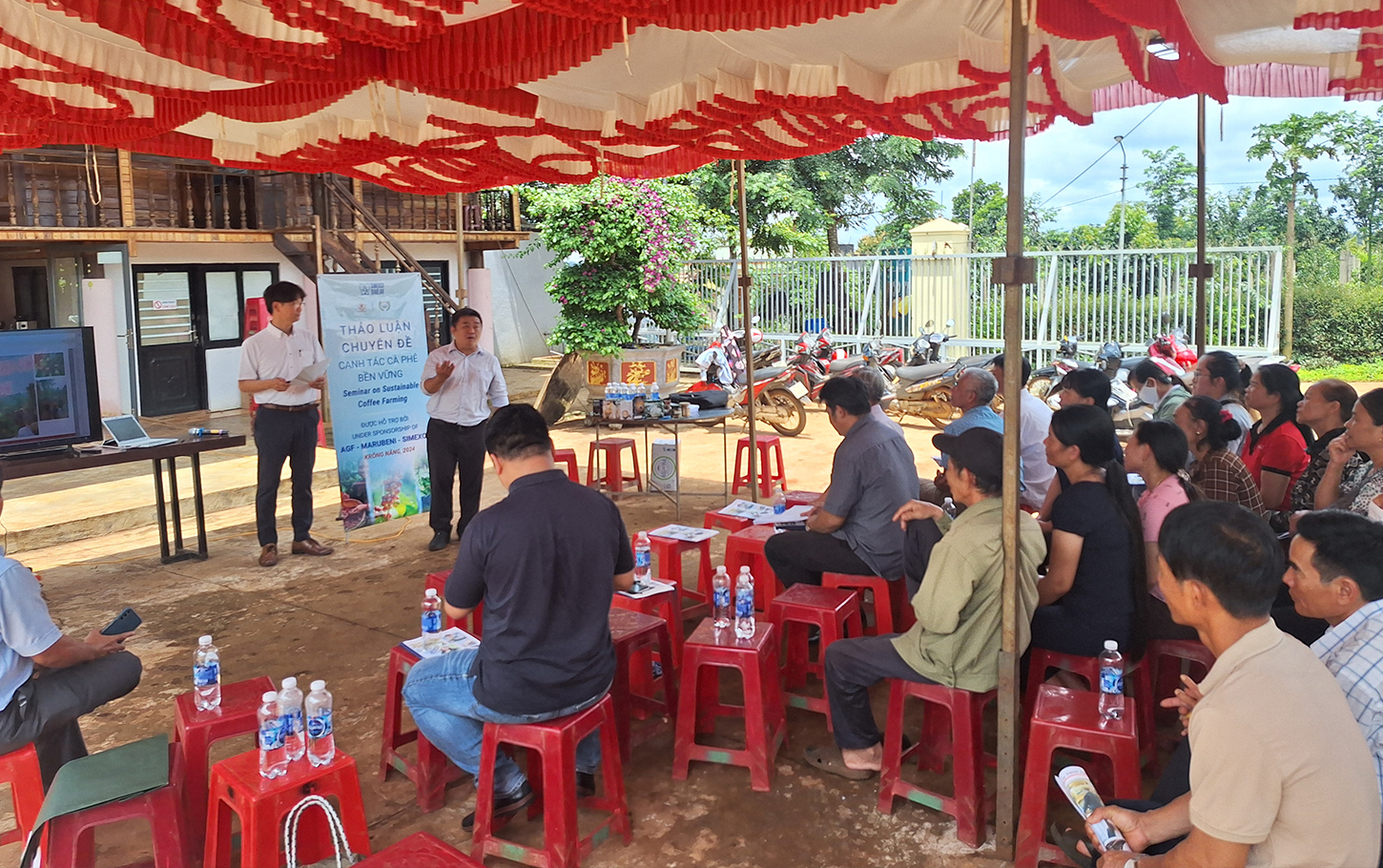
〈Follow-up〉
Based on the above evaluation, we traveled to the site in September 2024 to conduct human rights lectures for the farmers. Additionally, we revisited our trading partner, the exporter, to engage in dialogue regarding human rights issues. We will continue to engage in ongoing dialogue and work on mitigating human rights risks through building trustworthy and good partnerships.
- Human Rights Impact Assessment in Malaysia (Supply Chain of palm oil) (January 2024)
We visited Malaysia and conducted dialogues and interviews with palm oil refiners, palm farmers, foreign workers, certification bodies, etc.
* Regardless of direct or indirect transactions, we conducted an inspection of the palm oil supply chain in Malaysia.
〈Summary of results〉
No serious human rights issues, such as forced labor or child labor, were found within the scope of this time, and we will continue to investigate.
In Malaysia, there is a certification system called Malaysian Sustainable Palm Oil (MSPO) that is made mandatory by the government. Through dialogue with farmers, farmers' associations, the Malaysian Palm Oil Certification Council (MPOCC), which operates the certification system, we have understood that this certification is aiming for overall improvement in alignment with the current situations, considering the responsiveness of small-scale farmers and stakeholders involving in the Malaysian palm oil industry, and they were continually improving.
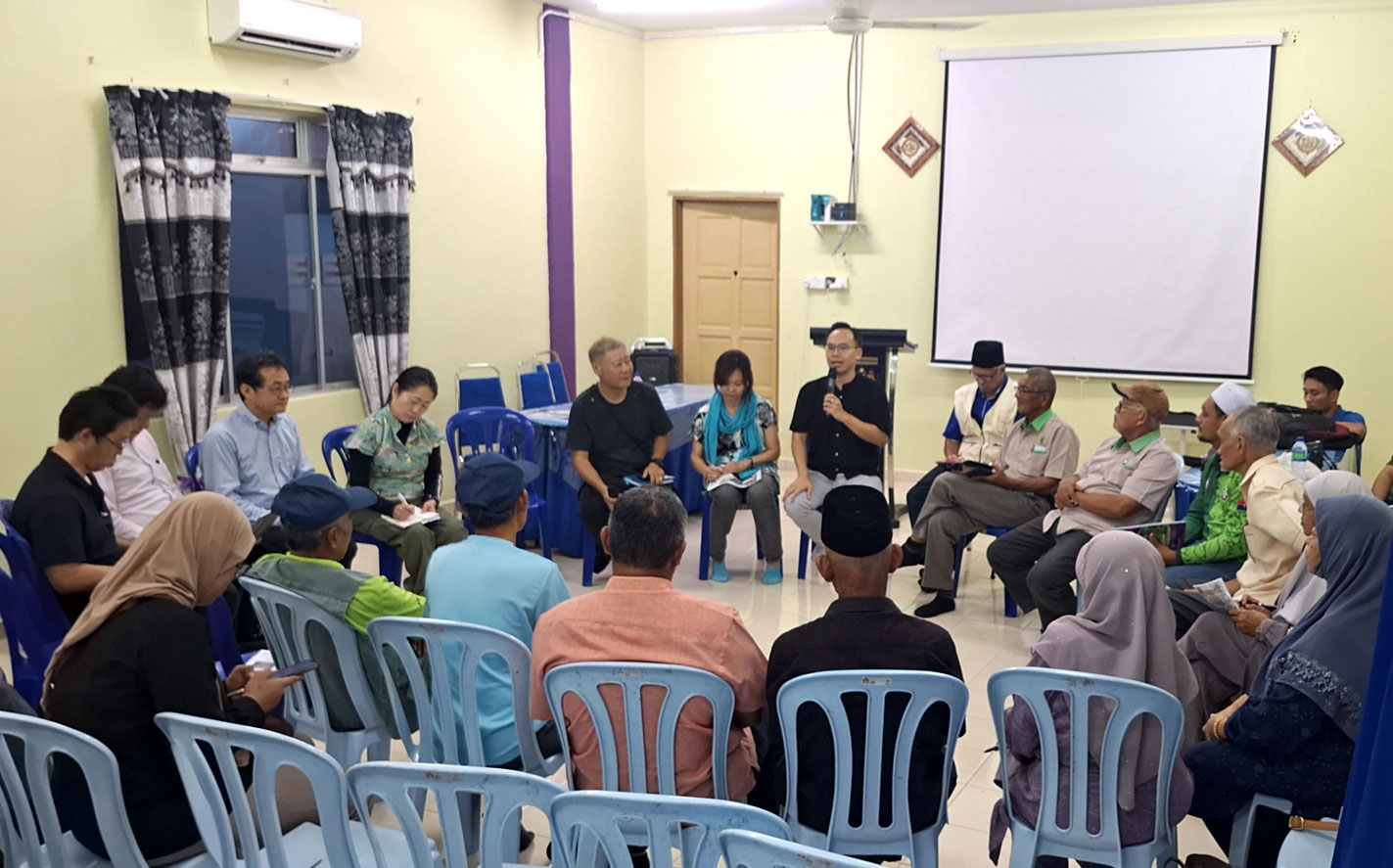
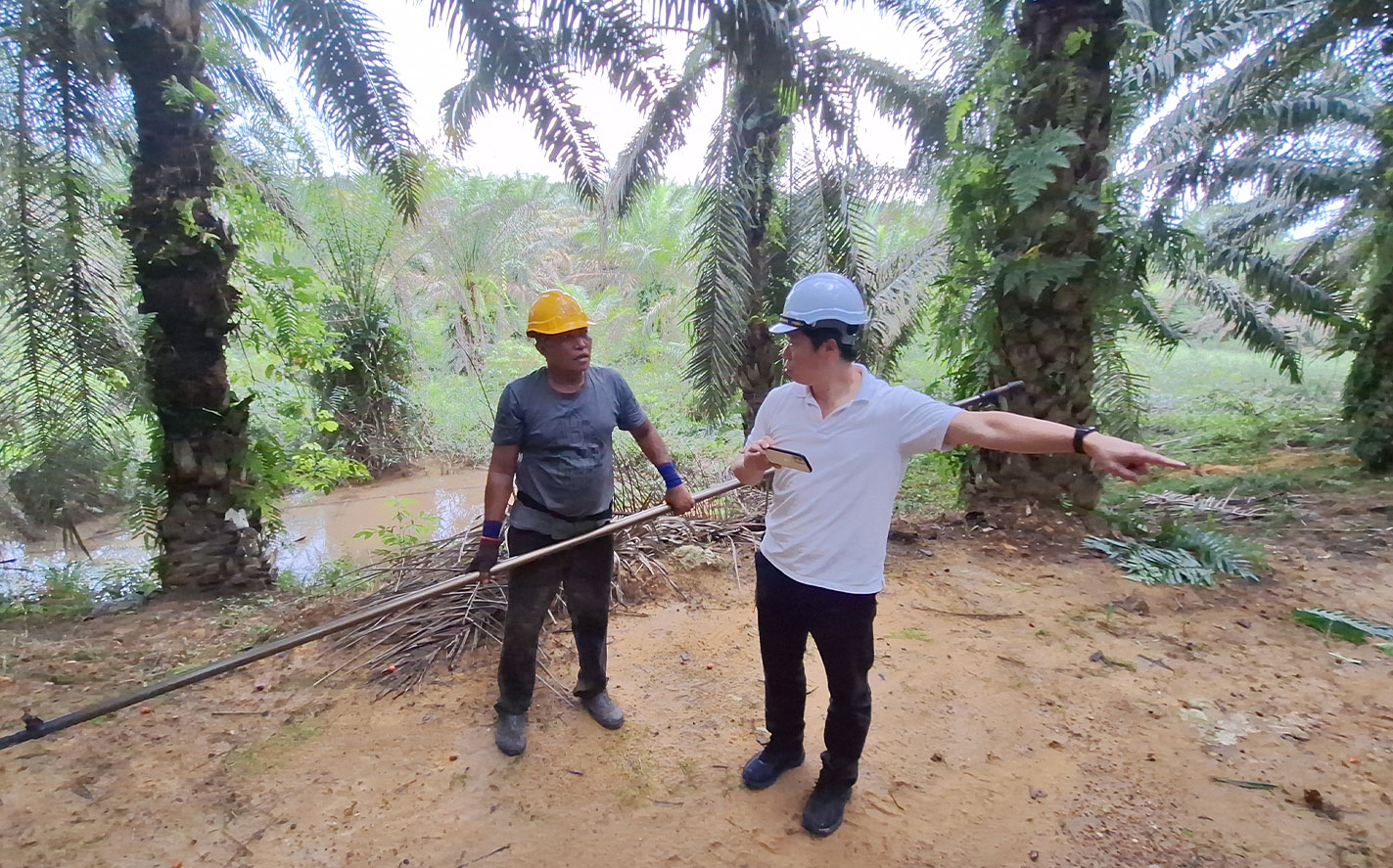
- Human rights impact assessment in Thailand (November 2024) *Second time since 2019
We conducted dialogue and interviews with shrimp farms, Processing companies and other stakeholders with external NGO**.
**ASSC (The Global Alliance for Sustainable Supply Chain)
〈Summary of results〉
This time, our investigations did not find any severe and actual negative impacts on human rights, such as forced labor or child labor, in the places we visited. However, according to local experts, serious human rights issues remain in Thailand, and foreign workers (in particular) are at the risk of human rights violation. Most of the workers in the shrimp farms and factories we visited are foreign workers (from neighboring countries), We will consider preventive measures regarding the identified potential negative impacts.
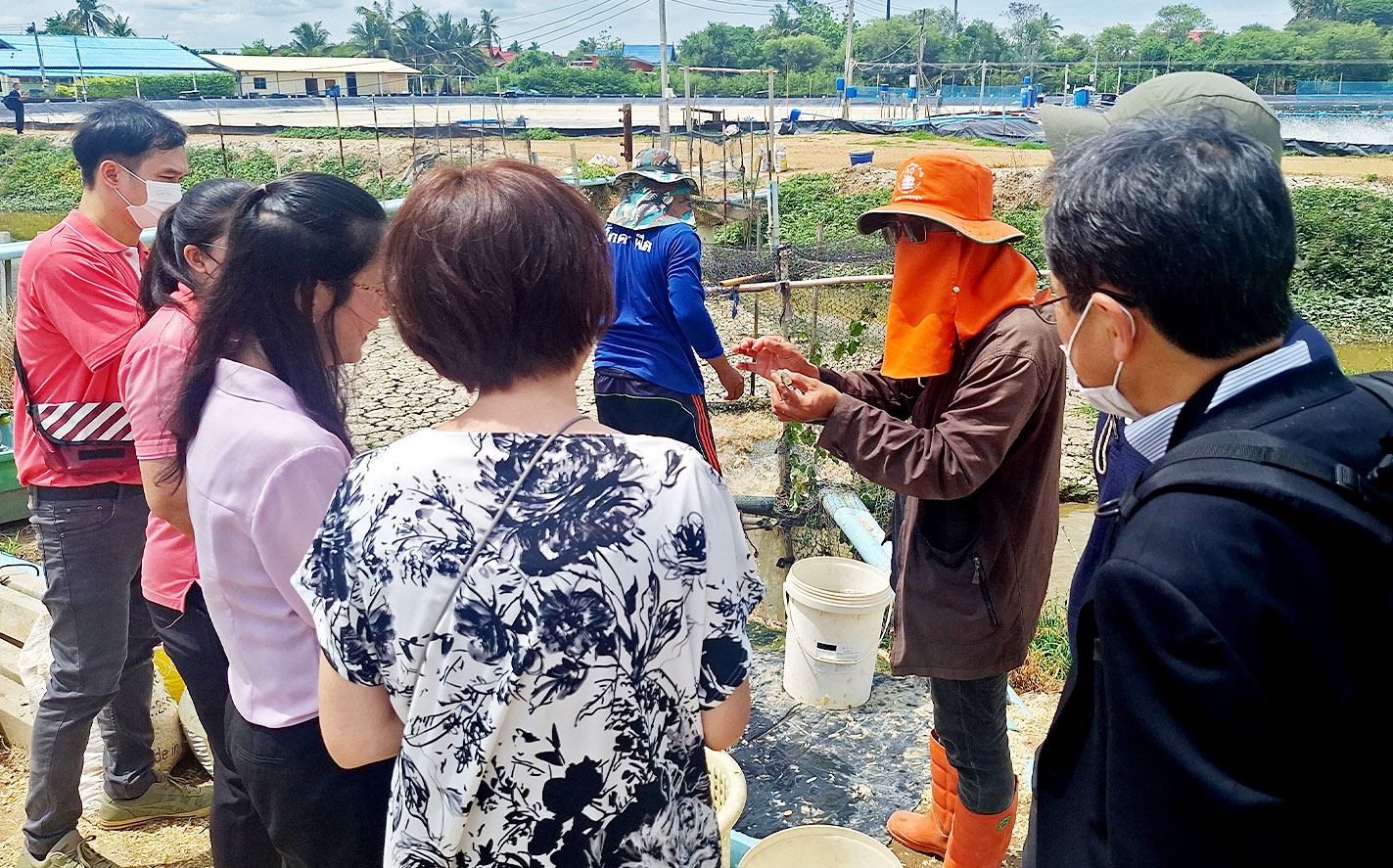
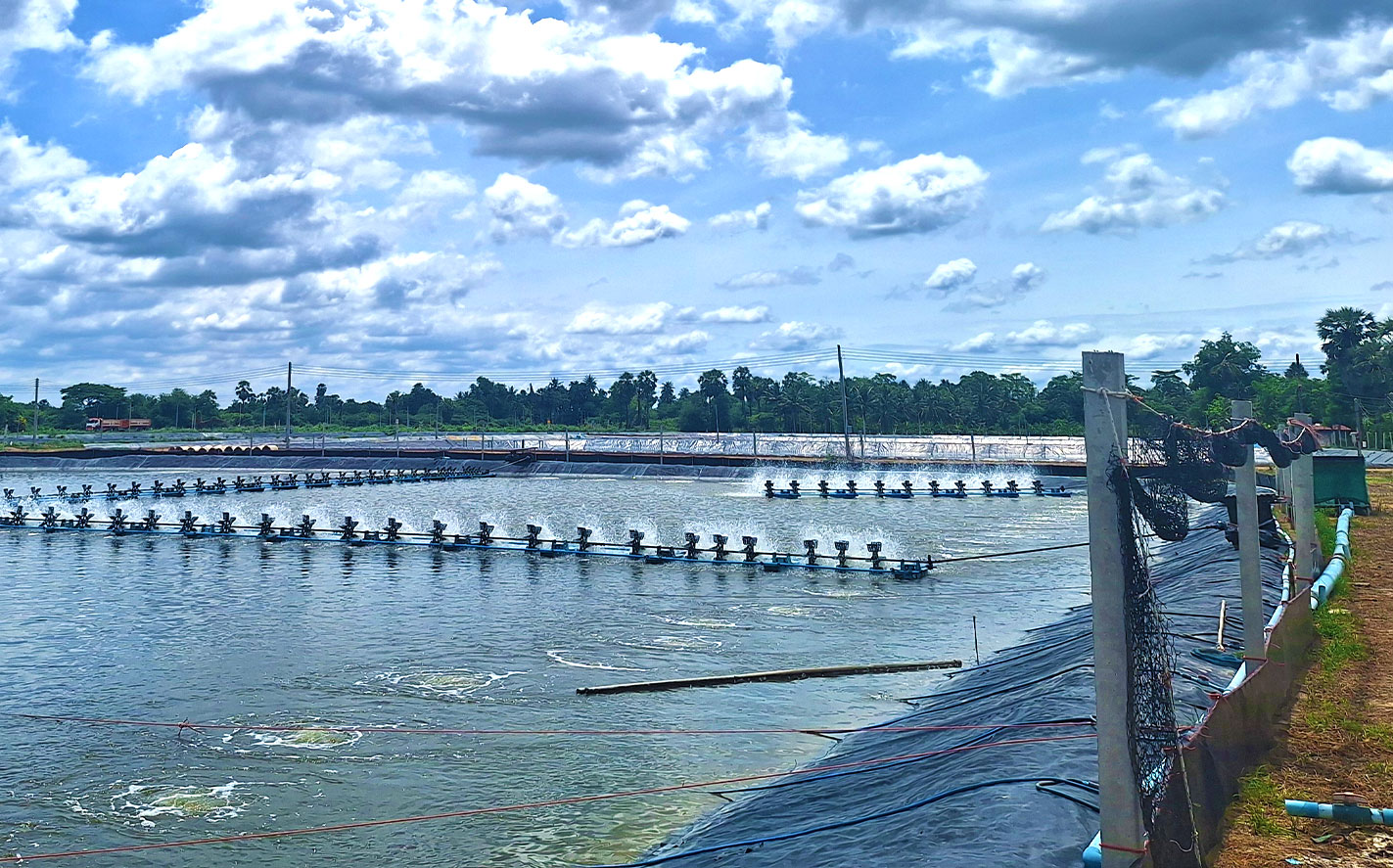
- Human Rights Impact Assessment in Brazil (Supply Chain of coffee beans) (February 2025) *Second time since 2019
We went into the supply chain from the farms in the production areas to the shipment of coffee beans to Japan and other countries, and we conducted dialogues and interviews with management and workers regarding labor environments, labor conditions, occupational health and safety, and deforestation with external NGO**. Additionally, we exchanged information and opinions with local organizations (industry groups, certification bodies, regional agricultural cooperatives, NGOs).
**ASSC (The Global Alliance for Sustainable Supply Chain)
〈Summary of results〉
Within the scope of this investigation, no severe or actual negative impacts on human rights, such as forced labor or child labor, were found. However, challenges were observed in areas such as occupational health and safety, the employment methods of short-term workers during peak seasons, labor conditions, and living environments. It was confirmed that there is a need to revisit during the harvest season for on-site verification.


- Human Rights Impact Assessment in Brazil (Supply Chain of Soybeans) (February 2025)
We went into the local supply chain of soybeans and conducted dialogues and interviews with stakeholders such as farmers, transport facilities, and exporters with external NGO**.
**ASSC(The Global Alliance for Sustainable Supply Chain)
〈Summary of results〉
Within the scope of this investigation, it was found that much of the process has been mechanized, reducing risks related to occupational health and safety in manual labor. Additionally, various human rights risk mitigation efforts through independent sustainability activities by local companies (such as exporters) were confirmed. On the other hand, challenges unique to Brazil remain, such as occupational health and safety for truck drivers, land rights for indigenous peoples, and employment methods for short-term workers. The importance of initiatives from the Japanese side to improve supply chain transparency and foster mutual understanding regarding human rights was confirmed.


4. Prevent or Remedy Adverse Impacts, and Monitor and Assess Effectiveness
(1) Initiatives With Suppliers and Business Partners
The Ajinomoto Group established the Group Shared Policy for Suppliers, which describes seven expectations of suppliers necessary to fulfill our corporate responsibility, social responsibility, and contributions to a sustainable society. In addition, our Guidelines for Group Shared Policy for Suppliers states clear, specific actions for suppliers to take under two categories:
- [Mandatory]: Actions required for all suppliers
- [Developmental]: Matters encouraged for suppliers
The intent of these policies is to avoid causing or contributing to adverse impacts on human rights by companies or organizations with whom the Ajinomoto Group has business relationships. We address such impacts should they occur. We also seek to prevent or mitigate adverse impacts on human rights linked directly to Ajinomoto Group operations, products, or services through business relationships, even if not contributing to such impacts. We hold information sessions regularly (twice a year) for major raw material suppliers to inform them of the Ajinomoto Group approach and current status, exchanging opinions as appropriate.
- Group Shared Policy for Suppliers
- Guidelines for Group Shared Policy for Suppliers
- Sustainable materials sourcing[PDF:3.1MB]

Guidelines for Group Shared Policy for Suppliers Compliance Survey
As part of our initiatives to be comprehensive in approach, the Ajinomoto Group aims to monitor the adverse human rights impacts of business partners across all transactions in our value chains as we head toward 2030. Our aim here is to prevent or correct any impacts. Through this initiative we complement our efforts to delve deeper in minimizing human rights risks in our value chains by comprehensively identifying and understanding risks not detected otherwise.
In 2018, Ajinomoto began using Sedex*1 to create an overall picture of our suppliers. In 2022, we created a custom questionnaire based on the Guidelines for Group Shared Policy for Suppliers, called Questionnaire for Group Shared Policy for Suppliers (QAPS*2). This questionnaire is part of our efforts to strengthen initiatives for suppliers based on the UNGPs. We use these tools to understand and identify risks related to governance, human rights (forced labor, child labor, etc.), occupational health and safety, and other risks at our business partners. We engage in dialogue with high-risk business partners to support their work in preventing and improving human rights issues. Through these processes, we aim to monitor and evaluate the effectiveness of prevention and remediation of human rights issues in the supply chain on an ongoing basis.
*1 Abbreviation for Supplier Ethical Data Exchange. A not-for-profit organization that provides data on labor standards, business ethics, etc., within global supply chains.
*2 QAPS: Questionnaire for Ajinomoto Group Shared Policy for Suppliers
Questionnaire for Group Shared Policy for Suppliers (QAPS)
QAPS is an evaluation chart that surveys (in questionnaire format) whether specific practices are in place based on requirements for suppliers in accordance with the Guidelines for Group Shared Policy for Suppliers. The questionnaire consists of 86 items and covers our efforts to address human rights due diligence as required by ILO and other global standards. We rate the overall implementation status of the requirements at suppliers on a 5-point scale based on the responses. Another purpose of this questionnaire is to encourage suppliers to understand their own human rights risks and explore ways to correct and make improvements. When we identify a supplier as high-risk, the Ajinomoto Group engages in dialogue with the said supplier, providing support to prevent and improve human rights issues.
| Major Items | Secondary Items |
|---|---|
| Ⅰ. Compliance With Statutory and Regulatory Requirements, and Accepted Social Norms | • Prohibition of Corruption, Bribery, and Related Illegal Acts • Prevention of the Abuse of Superior Bargaining Positions • Prohibition of Giving and Receiving Inappropriate Benefits • Prohibition of Behavior That Restricts Competition • Respecting Intellectual Property • Information Disclosure • Engaging in Appropriate Export and Import Management • Eliminate Any and All Relations With Antisocial Forces • Prevention and Early Detection of Misconduct |
| Ⅱ. Respect for Human Rights | • Respect for Human Rights • Prohibition of Forced or Compulsory Labor • Prohibiting Child Labor • Prohibiting Discrimination • Prohibiting Inhumane Treatment and Harassment • Appropriate Salaries and Wages • Appropriate Management of Working Hours • Rights of Employees to Organize • Ensuring Access to Remedy |
| Ⅲ. Occupational Health and Safety | • Ensuring Safety in the Workplace • Management of Facilities and the Workplace Environment • Ensuring Clean and Sanitary Workplaces |
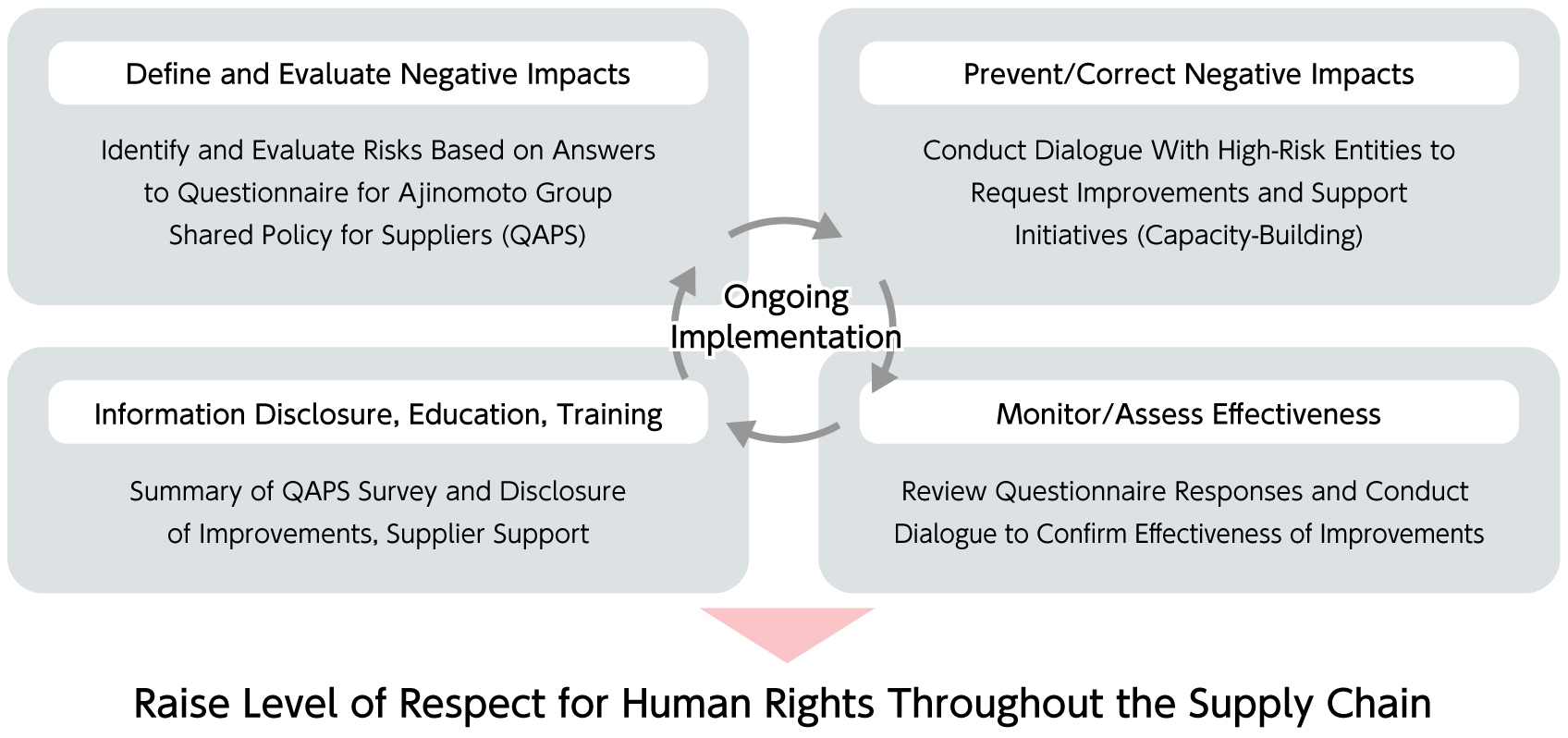
〈Survey Results〉
We conduct surveys of suppliers regarding their compliance with the Guidelines for Group Shared Policy for Suppliers according to the following phases and in light of the Ajinomoto Group business environment.
| Survey Timing | Target | Responding Suppliers/Target Suppliers | Response Rate |
|---|---|---|---|
| 2022 | Primary food ingredient and packaging materials suppliers in Japan | 938 responses from 998 companies | 92% |
| 2023 to 2024 | (excluding companies surveyed in 2022) Raw materials and packaging materials suppliers in Japan and domestic subcontractors* involved in products (*Manufacturing, industrial waste, equipment and construction subcontractors, etc.) |
1,219 responses from 1,695 companies | 72% |
The 2023-2024 survey confirmed that roughly 50% of suppliers are fully compliant with mandatory items. At the same time, we concluded that 23% of the companies surveyed have room for improvement related to high-risk matters.
| 2022 | 2023-2024 | ||
|---|---|---|---|
| A | Fully compliant with all items designated mandatory by the Ajinomoto Group. | 53% | 49% |
| B | Compliance to a certain degree with items designated mandatory by the Ajinomoto Group. | 5% | 7% |
| C | No improvement in certain items designated as mandatory by the Ajinomoto Group. | 20% | 20% |
| D | No improvement in numerous items designated as mandatory by the Ajinomoto Group. Or, room for improvement in certain particularly high-risk items designated as mandatory by the Ajinomoto Group. |
19% | 19% |
| E | Room for improvement in numerous particularly high-risk items designated as mandatory by the Ajinomoto Group. | 3% | 3% |
Improvement Efforts -Dialogue
We sent a summary report of the Questionnaire for Ajinomoto Group Shared Policy for Suppliers to all suppliers who responded to the 2022 questionnaire. The report provides a summary of results and risk status for the individual supplier in question.
We held individual dialogues with suppliers (12 companies total) that we identified as having room for improvement to confirm the progress of initiatives, exchange opinions, and provide information for improvement. The purpose of these efforts is to communicate the idea of respect for human rights to our suppliers. These efforts lead to sustainable business activities and encourage suppliers to recognize their own strengths and weaknesses, improving those weaknesses to work together in promoting respect for human rights for all stakeholders involved in the supply chain.
| No. | Implementation Period | Location | Procured Items | Dialogue Format |
|---|---|---|---|---|
| 1 | Mar-24 | Japan | Raw Materials | Visit/In-person |
| 2 | Jun-24 | Japan | Raw Materials | Online |
| 3 | Jun-24 | Japan | Raw Materials | Visit/In-person |
| 4 | Jul-24 | Japan | Raw Materials | Visit/In-person |
| 5 | Aug-24 | Japan | Raw Materials | Online |
| 6 | Aug-24 | Japan | Raw Materials | Online |
| 7 | Aug-24 | Japan | Raw Materials | Visit/In-person |
| 8 | Sep-24 | Japan | Raw Materials | Visit/In-person |
| 9 | Oct-24 | Japan | Packaging Materials | Visit/In-person |
| 10 | Dec-24 | Japan | Packaging Materials | Visit/In-person |
| 11 | Dec-24 | Japan | Packaging Materials | Visit/In-person |
| 12 | Feb-25 | Japan | Packaging Materials | Visit/In-person |
| Matters Requiring Attention | Positive Examples | Issues/Insufficiencies | Support and Improvement Proposals | |
|---|---|---|---|---|
| General |
|
|
|
|
| Ⅰ Compliance with laws and regulations |
|
|
|
|
| Ⅱ Respect for human rights | Policy |
|
|
|
| Human rights due diligence |
|
|
|
|
| Remedies |
|
|
|
|
| Ⅲ Health and safety |
|
|
|
|
| Supplier Comments and Reactions | ||||
|
||||
Future Direction
We plan to engage in dialogues with suppliers and improve the risk conditions of the suppliers who responded to the 2023-2024 survey (roughly 30 companies; schedule to be determined). We plan to expand the survey to overseas suppliers in 2025 and later, conducting a survey of suppliers in countries and regions with high human rights risks identified in our country-specific human rights risk assessments.
(2) Human rights of foreign workers
The Ajinomoto Group recognizes the vulnerable situation of migrant workers who are often exposed to high risks such as forced labour.
In 2020, we voiced our support for the Tokyo Declaration 2020 on Responsible Acceptance of Foreign Workers in Japan formulated by the Global Alliance for Sustainable Supply Chain (ASSC) regarding the recruitment of foreign workers under Technical Intern Training Program or those with Specified Skilled Worker visa. In fiscal 2021, we participated in the development of the Responsible Employment Guidelines for Migrant Workers as Technical Intern Trainees and Specified Skilled Workers in Japan as a member of the CGF Social Sustainability Working Group.
Based on these guidelines, we visited and held dialogues with supervising organizations and registered support organizations related to the technical intern trainees employed by domestic Ajinomoto Group companies and organizations that support the registration of Specific Skilled Workers. Through these efforts, we confirm that technical intern trainees and specified skilled workers are appropriately paid and provided support in their work and daily lives.
We also regularly visit sites where foreign workers are employed, mainly in domestic Ajinomoto Group companies, to understand and confirm working and housing conditions. We regularly hold direct dialogues with foreign workers and other on-site employees responsible for foreign workers to identify and remedy human rights risks.
| Year | Participants | Dialogue details |
|---|---|---|
| 2022 | Foreign technical interns and foreign workers with specified skills accepted within the Group (three companies and six plants) | Discussions on working conditions, living conditions, and support systems (confirming work sites and housing environments) |
| Supervising organizations and registered support organizations (six companies in total) | Discussions on support systems in employment and daily life | |
| 2023 | Technical intern sending organizations (Vietnam, two companies) | Interviews and discussions on education and support systems, costs, and other factors to be settled before sending trainees to Japan |
| International Organization for Migration (IOM) | Discussions on the current status of laws and regulations in Vietnam and immigration to Japan | |
| Foreign technical interns and foreign workers with specified skills accepted within the Group (three companies and six plants) | Discussions on working conditions, living conditions, and support systems (confirming work sites and housing environments) | |
| 2024 | Human rights NGOs, International Organization for Migration (IOM), etc. | Discussions on addressing recruitment-related costs for foreign workers. |
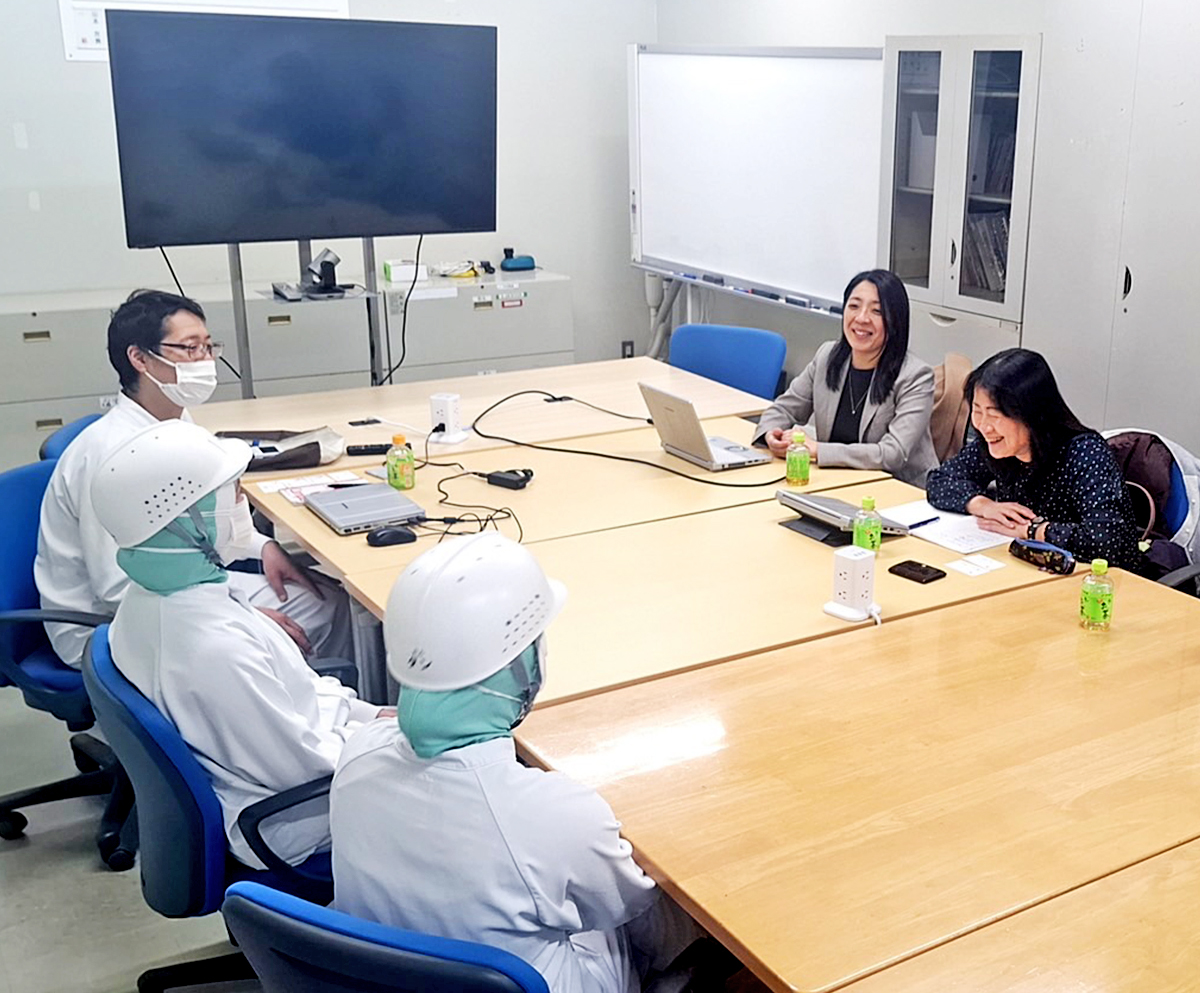
Dialogue With Foreign Workers
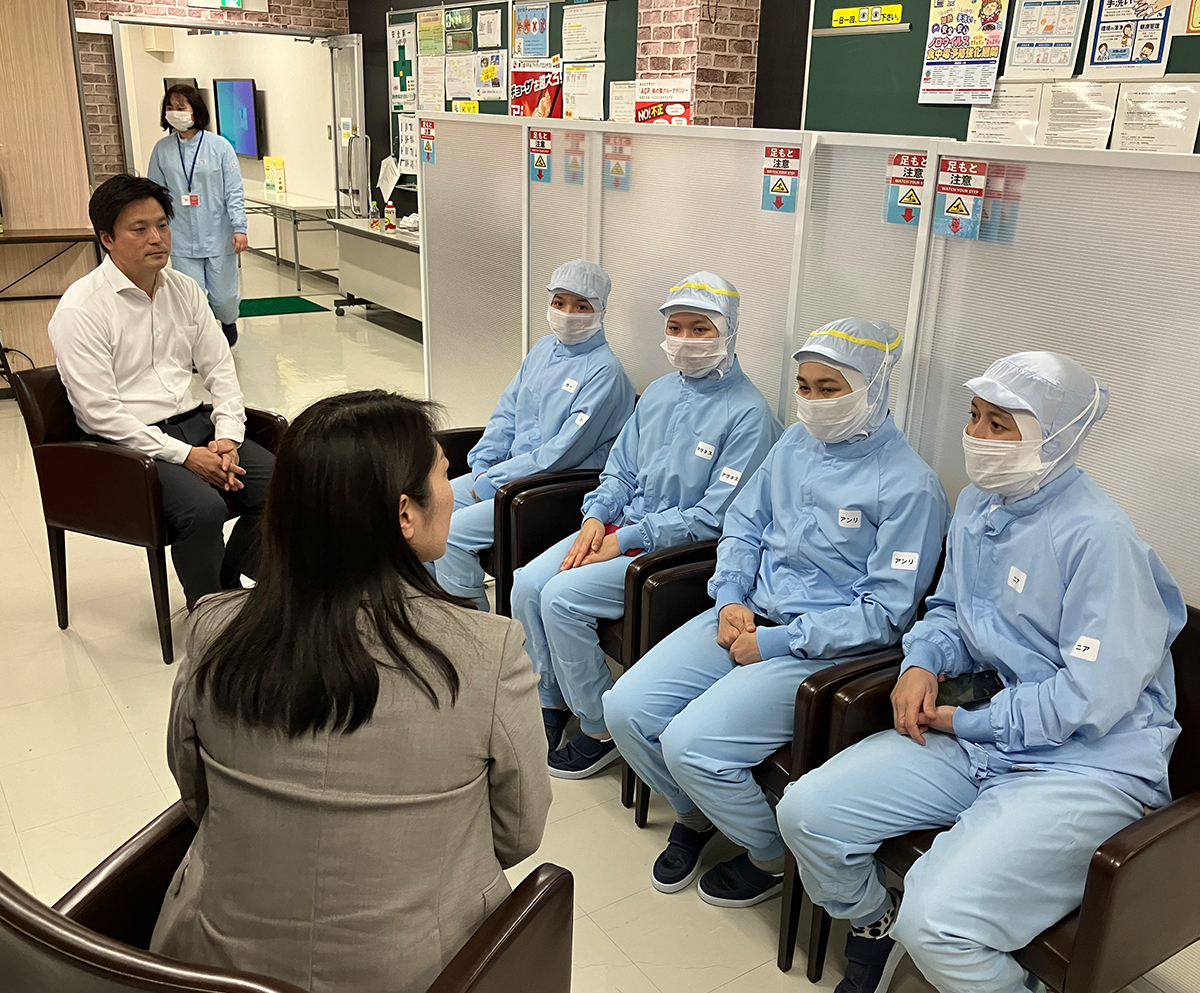
Dialogue With Foreign Workers
Recruitment-Related Expenses
Visits and dialogues with foreign workers at their employment sites have revealed the reality that foreign workers have borne recruitment-related costs in their home countries. In response, the Ajinomoto Group formulated Ajinomoto Group's Approach to Recruitment-Related Costs for Migrant Workers (March 2025) in compliance with the IHRB Dhaka Declaration, an international human rights standard, and the norms of international organizations such as the IOM and ILO. Our approach document clearly states that recruitment-related costs, including recruitment and placement fees, should be borne by the employer, not the worker. We will correct any problems that arise in accordance with this approach. We encourage all stakeholders involved in the employment of foreign workers (including recruitment agents and business partners) to do the same.
5. Information Disclosure, Education, and Training
(1) Education and Training Within the Group
The Ajinomoto Group holds training and briefing sessions on business and human rights for directors, employees, and business partners as needed.
(1) Anti-harassment measures
Each corporate entity in Japan provides a harassment counselor and a sexual minority (LGBT) counselor to offer a safe environment for consultation. We provide annual training (classroom lecture and role-play) conducted by an outside instructor to managers to update their knowledge. Role-play sessions cover examples likely to occur at each company, and participants learn how to deal with such situations.
(2) Human Rights in Business e-learning video
We provide an e-learning video(English/Japanese) on human rights issues across the value chain to Group employees in Japan and overseas. We created the video based on the Ajinomoto Group Shared Policy on Human Rights, aiming to raise awareness of Ajinomoto Group’s priority human rights issues and make human rights issues more personal to every employee. Considering the diverse backgrounds of viewers, this video includes subtitles and narration, and in some overseas subsidiaries, distribution in the native language has also begun.
2024 Video for Group employees in Japan (Excerpt)

(2)Compliance with Laws and Regulations on Respect for Human Rights in Each Country
The Ajinomoto Group adheres to human rights laws and regulations in each country as we develop our business globally.
- Compliance with the California Transparency in Supply Chains Act of 2010(CTSCA)
The Ajinomoto Group has disclosed the following statement from related local subsidiary regarding the California Transparency in Supply Chains Acts of 2010, which was enacted in California, USA.
6. Dialogue with Stakeholders
The Ajinomoto Group holds regular dialogues with human rights experts and stakeholders, sharing and communicating our initiatives externally as case studies to further our efforts to respect human rights and to obtain expert opinions.
Ⅲ. Remedies
1. Basic Concepts
The Ajinomoto Group established several consultation and reporting offices within and outside the group to promptly and appropriately address damage resulting from adverse human rights impacts. These consultation and reporting channels are operated in accordance with the 'Group Shared Policy on Whistle-blowing.' Each consultation office strictly protects whistleblower’s privacy, and related departments work together to appropriately address and resolve the situation.
Various hotline channels
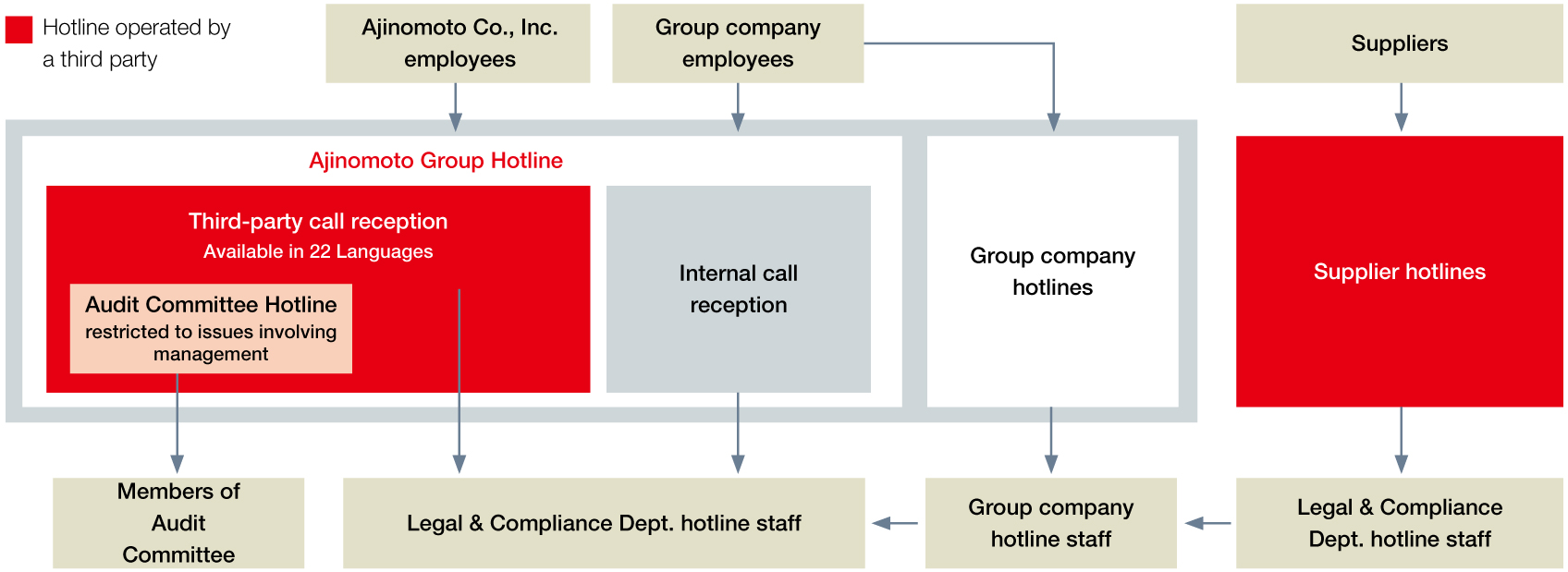
Response to whistleblowing
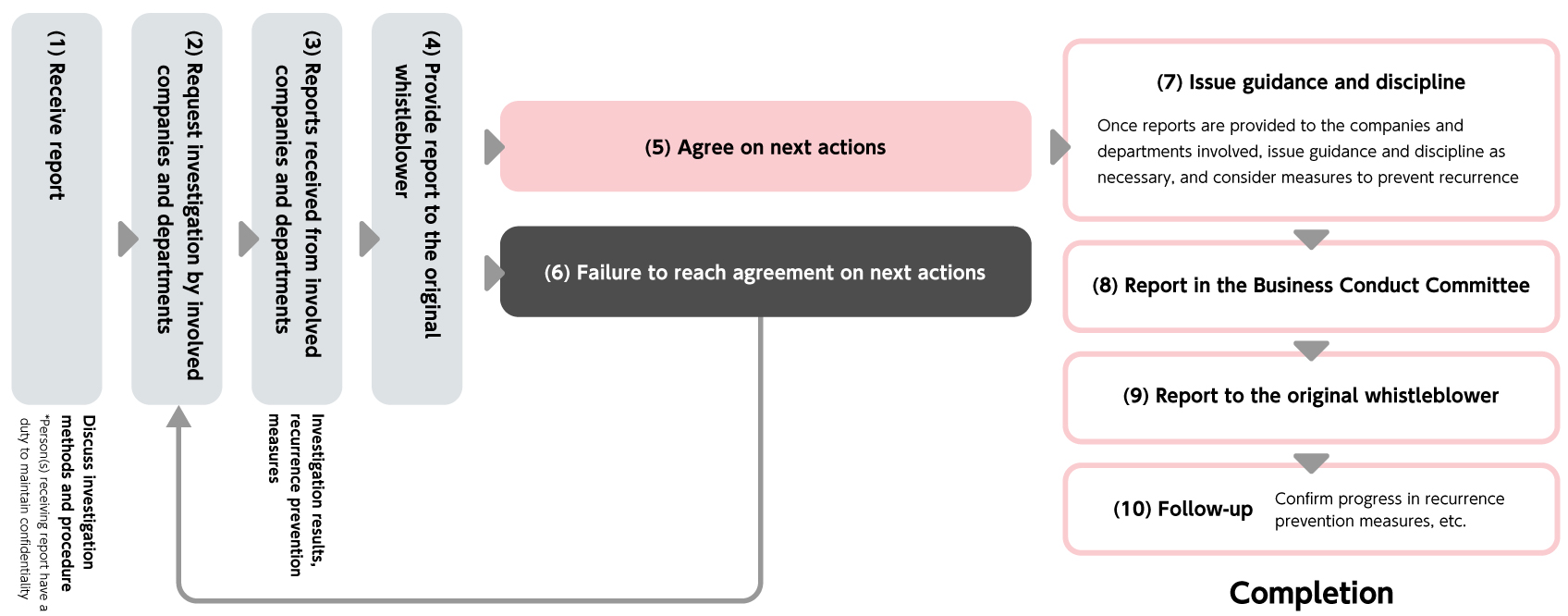
2. Internal reporting hotline
All employees (full-time employees, part-time employees, temporary employees, etc.) of the Ajinomoto Group, including overseas, can consult and report to the 'Ajinomoto Group Hotline.' This channel is globally accessible, allowing employees of group companies with overseas bases to consult in their native languages, supporting a total of 22 languages including English, Thai, and Vietnamese. In addition to the 'Ajinomoto Group Hotline,' there are also company-specific hotlines operated by group companies and 'Harassment and sexual minorities (LGBT), persons with disabilities Consultation Channels,' allowing for the selection of the appropriate reporting channel based on the content and situation of the consultation. Furthermore, consultations and reports can be made not only by the individual but also by colleagues or family members, and early consultation is encouraged while issues are still minor. Whistleblowers can choose to report either with their real name or anonymously.
- Bolstering our internal reporting hotline (whistle-blowing)
(Sustainability Report 2023 p.122)[PDF:518KB]
- Consultation Form

Number of hotline reports*
| FY2019 | FY2020 | FY2021 | FY2022 | FY2023 | |||||||
|---|---|---|---|---|---|---|---|---|---|---|---|
| Japan | Overseas | Total | Japan | Overseas | Total | Japan | Overseas | Total | |||
| Human rights, harassment | 45 | 50 | 36 | 5 | 41 | 38 | 19 | 57 | 52 | 41 | 93 |
| Employment, working conditions | 19 | 36 | 26 | 34 | 60 | 14 | 66 | 80 | 21 | 301 | 322 |
| Quality, environment, safety | 1 | 3 | 7 | 2 | 9 | 6 | 14 | 20 | 9 | 22 | 31 |
| Fraud | 4 | 3 | 9 | 4 | 13 | 2 | 6 | 8 | 5 | 5 | 10 |
| Social manners, ethics | 10 | 29 | 22 | 97 | 119 | 8 | 54 | 62 | 20 | 158 | 178 |
| Proper job performance | 8 | 45 | 19 | 2 | 21 | 16 | 5 | 21 | 30 | 12 | 42 |
| Other | 6 | 4 | 8 | 107 | 115 | 9 | 213 | 222 | 15 | 701 | 716 |
| Total | 93 | 170 | 127 | 251 | 378 | 93 | 377 | 470 | 152 | 1,240 | 1,392 |
3. Business Partner Reporting Hotline
The Ajinomoto Group established the Supplier Hotline in fiscal 2018 as a contact point for reporting from suppliers. Reports and consultations are accepted not only from primary suppliers but from all business partners in the supply chain. Additionally, the 'The Group Customer Service Center' accepts reports and consultations from all stakeholders in the value chain, including customers and local residents.
4. Hotline for Foreign Workers
The Ajinomoto Group has been participating in an advisory capacity since the 2020 establishment of the Japan Platform for Migrant Workers toward Responsible and Inclusive Society (JP-MIRAI) created by the Japan International Cooperation Agency (JICA) together with other stakeholders, including companies, lawyers, and NGOs. The platform aims to resolve issues faced by technical intern trainees and Specific Skilled Workers. In fiscal 2022, we participated in the Consultation and Relief Pilot Project for Migrant Workers launched by JP-MIRAI. We provide appropriate information and consultation services to foreign workers employed by Ajinomoto Group companies in Japan.
We will also encourage our suppliers and business partners who employ foreign workers to offer similar services as a means to quickly identify labor and human rights issues in their supply chains.
What is the Japan Platform for Migrant Workers toward Responsible and Inclusive Society (JP-MIRAI)?
JP-MIRAI addresses issues faced by foreign workers in Japan through correct information for everyday living and a consulting desk offering assistance in native languages (JP-MIRAI Assist).
What is JP-MIRAI Assist?
JP-MIRAI Assist is a consulting desk for foreign workers living in Japan. Consulting is available by phone, chat, or e-mail, and foreign workers use the service to discuss general problems with employment and everyday living in Japan encountered by an individual or his/her family. As of February 2025, JP-MIRAI Assist provides services in 22 languages, with more to be added in the future. Depending on the nature of the consultation, the service also offers accompaniment to government agencies and specialists to provide appropriate support.
